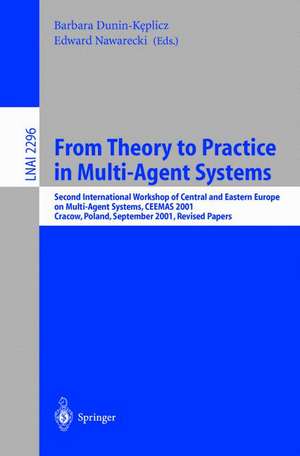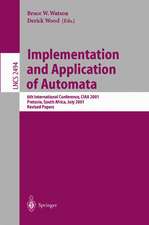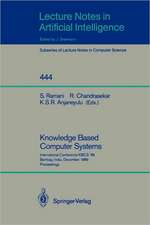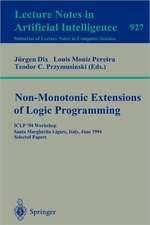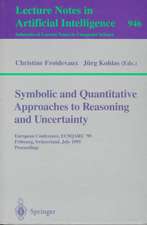From Theory to Practice in Multi-Agent Systems: Second International Workshop of Central and Eastern Europe on Multi-Agent Systems, CEEMAS 2001 Cracow, Poland, September 26-29, 2001, Revised Papers: Lecture Notes in Computer Science, cartea 2296
Editat de Barbara Dunin-Keplicz, Edward Nawareckien Limba Engleză Paperback – 13 mar 2002
Din seria Lecture Notes in Computer Science
- 20%
 Preț: 1061.55 lei
Preț: 1061.55 lei - 20%
 Preț: 307.71 lei
Preț: 307.71 lei - 20%
 Preț: 438.69 lei
Preț: 438.69 lei - 20%
 Preț: 645.28 lei
Preț: 645.28 lei -
 Preț: 410.88 lei
Preț: 410.88 lei - 15%
 Preț: 580.46 lei
Preț: 580.46 lei - 17%
 Preț: 427.22 lei
Preț: 427.22 lei - 20%
 Preț: 596.46 lei
Preț: 596.46 lei -
 Preț: 449.57 lei
Preț: 449.57 lei - 20%
 Preț: 353.50 lei
Preț: 353.50 lei - 20%
 Preț: 1414.79 lei
Preț: 1414.79 lei - 20%
 Preț: 309.90 lei
Preț: 309.90 lei - 20%
 Preț: 583.40 lei
Preț: 583.40 lei - 20%
 Preț: 1075.26 lei
Preț: 1075.26 lei - 20%
 Preț: 310.26 lei
Preț: 310.26 lei - 20%
 Preț: 655.02 lei
Preț: 655.02 lei - 20%
 Preț: 580.93 lei
Preț: 580.93 lei - 20%
 Preț: 340.32 lei
Preț: 340.32 lei - 18%
 Preț: 938.83 lei
Preț: 938.83 lei - 20%
 Preț: 591.51 lei
Preț: 591.51 lei - 15%
 Preț: 438.59 lei
Preț: 438.59 lei - 20%
 Preț: 337.00 lei
Preț: 337.00 lei -
 Preț: 389.48 lei
Preț: 389.48 lei - 20%
 Preț: 607.39 lei
Preț: 607.39 lei - 20%
 Preț: 1024.44 lei
Preț: 1024.44 lei - 20%
 Preț: 579.30 lei
Preț: 579.30 lei - 20%
 Preț: 763.23 lei
Preț: 763.23 lei - 20%
 Preț: 453.32 lei
Preț: 453.32 lei - 20%
 Preț: 575.48 lei
Preț: 575.48 lei - 20%
 Preț: 585.88 lei
Preț: 585.88 lei - 20%
 Preț: 825.93 lei
Preț: 825.93 lei - 20%
 Preț: 763.23 lei
Preț: 763.23 lei - 17%
 Preț: 360.19 lei
Preț: 360.19 lei - 20%
 Preț: 1183.14 lei
Preț: 1183.14 lei - 20%
 Preț: 340.32 lei
Preț: 340.32 lei - 20%
 Preț: 504.57 lei
Preț: 504.57 lei - 20%
 Preț: 369.12 lei
Preț: 369.12 lei - 20%
 Preț: 583.40 lei
Preț: 583.40 lei - 20%
 Preț: 343.62 lei
Preț: 343.62 lei - 20%
 Preț: 350.21 lei
Preț: 350.21 lei - 20%
 Preț: 764.89 lei
Preț: 764.89 lei - 20%
 Preț: 583.40 lei
Preț: 583.40 lei - 20%
 Preț: 649.49 lei
Preț: 649.49 lei - 20%
 Preț: 341.95 lei
Preț: 341.95 lei - 20%
 Preț: 238.01 lei
Preț: 238.01 lei - 20%
 Preț: 538.29 lei
Preț: 538.29 lei
Preț: 335.36 lei
Preț vechi: 419.20 lei
-20% Nou
Puncte Express: 503
Preț estimativ în valută:
64.17€ • 67.18$ • 53.10£
64.17€ • 67.18$ • 53.10£
Carte tipărită la comandă
Livrare economică 05-19 aprilie
Preluare comenzi: 021 569.72.76
Specificații
ISBN-13: 9783540433705
ISBN-10: 3540433708
Pagini: 356
Ilustrații: X, 346 p.
Dimensiuni: 155 x 235 x 19 mm
Greutate: 0.5 kg
Ediția:2002
Editura: Springer Berlin, Heidelberg
Colecția Springer
Seriile Lecture Notes in Computer Science, Lecture Notes in Artificial Intelligence
Locul publicării:Berlin, Heidelberg, Germany
ISBN-10: 3540433708
Pagini: 356
Ilustrații: X, 346 p.
Dimensiuni: 155 x 235 x 19 mm
Greutate: 0.5 kg
Ediția:2002
Editura: Springer Berlin, Heidelberg
Colecția Springer
Seriile Lecture Notes in Computer Science, Lecture Notes in Artificial Intelligence
Locul publicării:Berlin, Heidelberg, Germany
Public țintă
ResearchCuprins
Invited Papers.- Approximate Reasoning by Agents.- Network Services in Context of Pervasive Mobile Internet.- Regular Papers.- On BAN Logics for Industrial Security Protocols.- A Concept of Agent Language in Agentspace.- Agent’s Adaptivity — Some Aspects of Theoretical Foundations of a Neural Agent Training Process.- Mobie: Personalized Automated Recharge of Prepaid Mobile Phones.- A Formal Specification of M-Agent Architecture.- Multi-agent System for Flexible Manufacturing Systems Management.- Motivational Attitudes of Agents: On Desires, Obligations, and Norms.- On Commitments, Roles, and Obligations.- Automata-Based Multi-agent Model as a Tool for Constructing Real-Time Intelligent Control Systems.- Rascal — A Resource Manager for Multi Agent Systems in Smart Spaces.- Software Development Kit for Multi-agent Systems Design and Implementation.- Formal Semantics for Behavioural Substitutability of Agent Components: Application to Interaction Protocols.- A Modelling Environment for Mind and Matter Aspects of Intentional Behaviour.- Temporal Languages for Simulation and Analysis of the Dynamics within an Organisation.- Syntactic Pattern Recognition-Based Agents for Real-Time Expert Systems.- Learning User Preferences in Multi-agent System.- Towards Requirements Analysis for Autonomous Agent Behaviour.- Messages, Clocks, and Gravitation.- An Improved Q-Learning Algorithm Using Synthetic Pheromones.- Organisations in the Particular Class of Multi-agent Systems.- UML for Behavior-Oriented Multi-agent Simulations.- Robot Disassembly Process Using Multi-agent System.- CPlanT: An Acquaintance Model-Based Coalition Formation Multi-agent System.- Efficient Model Checking of Causal-Knowledge Protocols.- Volcano, a Vowels-Oriented Multi-agent Platform.- Model of Cooperationin Multi-agent Systems with Fuzzy Coalitions.- Learning Collective Behaviour from Local Interactions.- MAS Oriented Patterns.- Multi-agent Architecture for Knowledge Fusion from Distributed Sources.- Universal Formal Model of Collective Intelligence and Its IQ Measure.- A Programming Language for Coordinating Group Actions.- Optimization of Resource Allocation in Distributed Production Networks.- Utility-Based Role Exchange.
